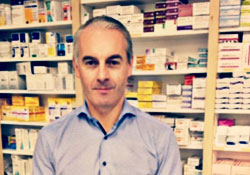eLearning helps Irish pharmacists take on antibiotic stewardship

WHO
Pharmacists are key members of the primary care workforce and find themselves increasingly on the frontline of the struggle against antibiotic resistance. This field is increasing in importance and changing rapidly, yet the pressure of every day life in a busy community pharmacy can make it difficult to keep up to speed on the latest developments.
For Paul Whyte, a retail pharmacist in Athlone, Ireland, eLearning has made all the difference. Whyte recently took an eLearning course on antibiotic stewardship, and was very satisfied with the outcome. The course was provided by the Irish Institute of Pharmacy, an organization that was created in 2013 by the Pharmaceutical Society of Ireland, to establish and maintain a continuing professional development system for pharmacists.
“Twenty years ago when I graduated from the University of Strathclyde in Scotland, antibiotic resistance was not a big deal,” explains Whyte. “I was always interested in antibiotics and knowing about the problems with resistance, so I wanted to get up to speed with what is recommended and not recommended any more.”
He continues, “People know more than they used to, but some people just want antibiotics for everything and wrongly believe they’re a ‘magic bullet’ solution. In Ireland, people understand antibiotics are something you only get from the doctor and that is well enforced, but there’s always the occasional opportunist who will try their luck and ask me for them. And then there are people who will come back from holiday with a half course of antibiotics they got abroad and they’re wanting some more to finish the course.”
Whyte agrees that pharmacists play an important role in the community, working in partnership with general practitioners and giving the public informed advice about the proper use of antibiotics. He says, "There have been some very good health promotion campaigns in Ireland about flu and the fact that antibiotics don't help against a virus. However, fewer people know that recommendations have changed for antibiotics for urinary tract infections, for example, so it's important to be able to explain that, when needed."
Whyte says, “Before online learning you might pick up a journal and you might or might not apply that knowledge to your work. This eLearning course was really designed to be applicable in my day-to-day work and I’ve been able to use it in that way.”
He admits he was unconvinced at first but was soon won over by the practicality of eLearning: “Online courses are great. You can study whenever it suits you best. The course on antibiotic resistance used a lot of video, which made it very accessible and you could just stop and start as required. Online courses are also great because they can be constantly updated, unlike a book that sits on your shelf.”
Whyte has also taken a number of other eLearning courses on topics such as cardiovascular disease and the care of the elderly with an overview of drug use, looking at how drugs are used differently for older people than for other patients. “In my pharmacy we look after two nursing homes, so this was very relevant for me,” says Whyte.
According to Clayton Hamilton, leader of WHO/Europe’s eHealth and Innovation Unit, eLearning presents a significant and largely untapped opportunity for the European Region: “71% of Member States in the European Region report using eLearning for training of health professionals; however, this training is rarely offered in all relevant national organizations and institutions. We at WHO/Europe would like to see all our Member States benefiting from the advantages of eLearning in continuing professional development for healthcare workers. The pace of change is so rapid, especially in a field like antibiotic resistance, so eLearning is one of the most effective ways that professionals can keep up with the latest developments.”
Paul Whyte agrees and, after taking a well-deserved break for Christmas, he intends to tackle an eLearning course on First Aid.



